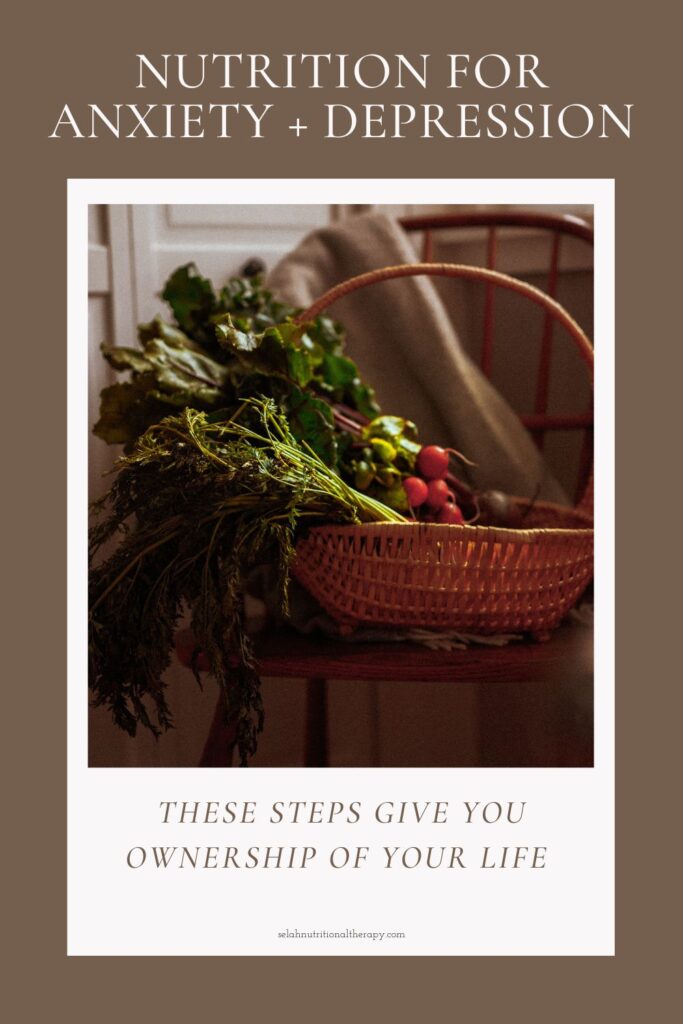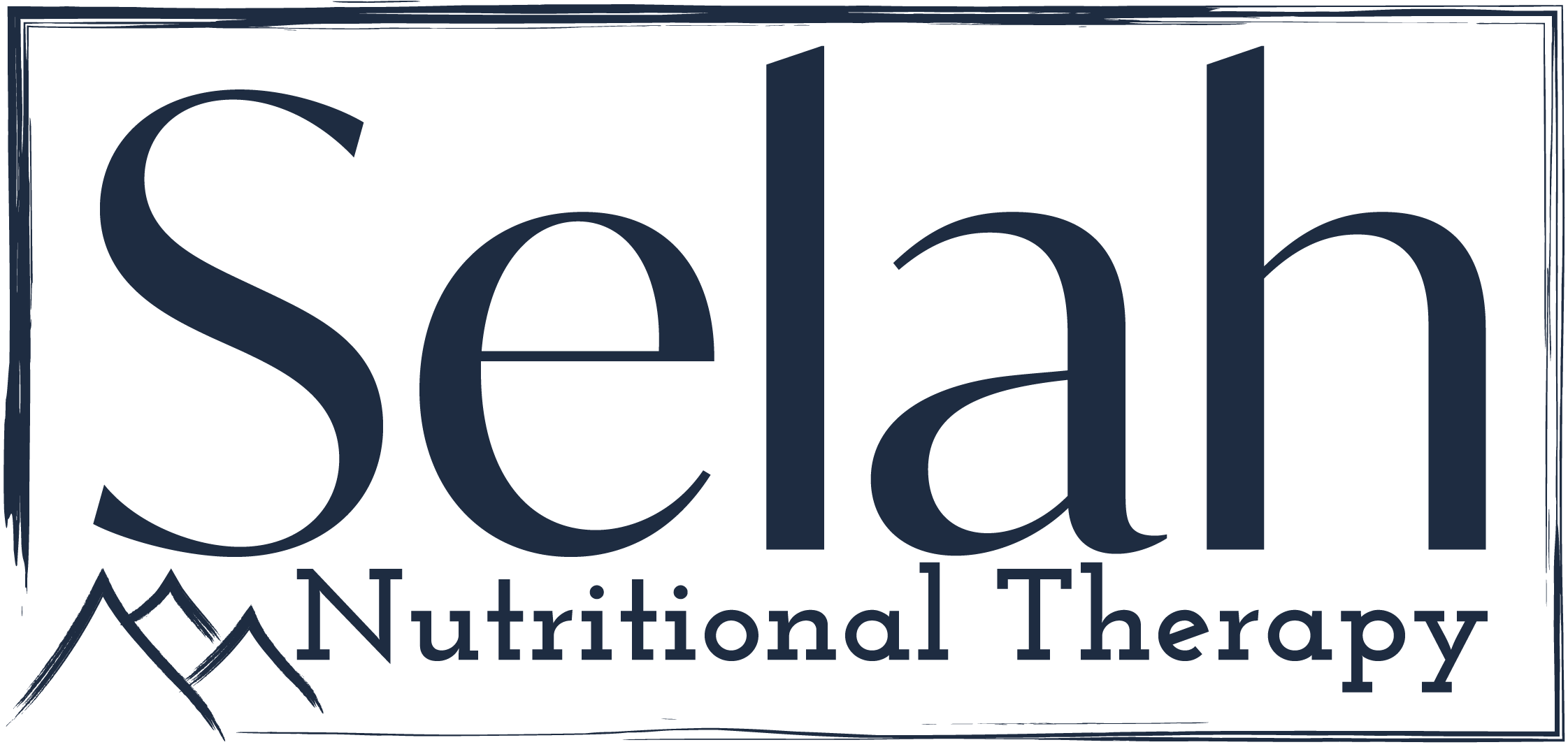I wish I wasn’t writing this from experience. Battling mental health makes you feel like a helpless victim of your own brain- at least it did for me. This post contains a brief overview of supporting elements of nutrition for dealing with anxiety + depression. This is what I’ve learned through years of study in this area, with both personal experience and also professional experience. I am not making these suggestions lightly. These are elements that give you back some control and ownership of your life- even if it feels very chaotic at the moment.
These are not meant to be used in place of current medications or proper therapies. These principles can be used along side current treatments to support the recovery process. I wish to only provide hope that things can and do get better.
Read more about my personal experience here.
1. Quality sleep
Proper sleep is wildly important to restore the body’s energy, detoxify, and recharge the brain. If you’re unable to sleep well, your cognitive perfromance will be impaired. People regularly report worsening symptoms of anxiety and depression following a poor nights sleep. Establishing a good sleep hygiene routine takes practice and learning how your body does best. One small step to start, is to set a consistent sleep/wake time. This helps your body adjust into it’s natural circadian rhythm- making falling asleep and waking easier.
Related: How to improve sleep quality
2. Proper Hydration
Water is the most essential nutrient for the body. While it carries waste and toxins out of the body, it also allows cells in the body to communicate properly.
Proper hydration would help to balance energy, improve mental clarity + detoxification and increase bowel movements.
Go easy on things like coffee, tea, and soda which pull water from your cells. Hydrate well with clean water- starting with half of your body weight in ounces as a baseline. Adding electrolytes, lemon, or a pinch of quality sea salt, can also improve the body’s ability to absorb this water and use it properly.
3. Properly Balanced Diet
Overconsumption of heavily processed foods will not have a positive effect on your brain’s performance. Each time you choose to consume a fresh whole food, you are choosing to do something beneficial for your body. Fresh whole foods contain vital vitamins and minerals that are essential for brain performance or recovery. Amazingly- unlike supplements, these foods are created with the perfect balance of codependent nutrients that enhance the body’s ability to use the micronutrients to their best capacity. Nutrients like B vitamins, Omega 3s, Magnesium, Vitamin D, Tryptophan and so on- are vitally important to brain function and are available in many whole food choices.
Read more about how to build a balanced meal here.
4. Blood Sugar Management
Having difficulty managing daily blood sugar is very common. This would show itself in symptoms like irritability, energy crashes, dizziness, brain fog, poor stress tolerance, cravings, mood swings etc.
Essentially the brain’s energy source is unstable. It has been conditioned to rely on a steady stream of sugar to stay running. When that sugar isn’t provided, it turns to the stress hormones in time of need. This only causes more stress and leaves you feeling very depleted while contributing to long term damage.
Two small steps to try out for 1 full week to see how you feel:
1. Routinely eat a quality breakfast
Breakfast makes the most impact on your blood sugar of any other meal. Prioritize the presence of protein and fat each morning. Things like eggs, avocado, breakfast meats, full-fat yogurt, protein pancakes etc- create a better balance to begin the day.
Read more about choosing a quality breakfast here.
2. Don’t eat naked carbs
A solo banana or an English muffin for example- these are digested quickly and spike blood sugar leading to a yo-yo effect of symptoms throughout the day. Always try to pair your carbohydrates with a protein or fat (nut butters, cheese, olives, meat sticks…) More complex snacks + meals provide the body
5. Nutritional Supplementation
Specific foods have an amazing benefit on anxiety and depression. Sometimes you need more targeted support. Nutrient deficiencies are common yet vary from person to person.
One step to take would even be a quality multivitamin made from food (for better absorption)
Also consider supplemental support for things like:
- Amino acids
- Vitamin D: mood regulation
- Omega 3: brain food
- Magnesium: relaxant
- B vitamins- energy + neurotransmitter support
- NAC- manages inflammation + regulates neurotransmitters
- Zinc- improves depressive symptoms Adaptogenic herbs like rhodiola + ashwagandha- calming,
- L-theanine- stress relief
- GABA- relaxing.
This is not a comprehensive list. Also recognize not all supplements are created equal and quality will impact the absorption + effectiveness. While some of these may be supportive in combination with medications- some are not, and should be consulted with your current medical practitioner for any possible negative interactions.
I also specifically recommend the Mediterranean Eating Pattern for those wanting to improve their anxiety + depression.
6. Behavioral Activation + Movement
Behavioral activation refers to the understanding of how our behavior influences our mood. This would requires a choice to do something you know you love- even when you don’t want to. This would include things like engaging in hobbies, spending time with pets, family, or even seeing friends. This is a disciplined approach to climbing your way out of the pit of depression and anxiety- when everything feels numb and disconnected. You may even dislike doing it the entire time. But this practice of consistent effort to bring back yourself helps to grow + strengthen that real version of you that is buried under the weight of a disorder. This may require help + encouragement from others.
Engaging in exercise produces serotonin, decreases stress + brain fog and improves sleep quality.
Long term- it inarguably helps.
Short term- it’s very hard.
This would come back to recognizing the choice to make and possibly asking for help in accountability or encouragement .
7. Self Care
If I’m being honest, I hate that term. But I recognize the impact of consciously making a choice to care for yourself. Whether it is a bath, painting your nails, saying no to things that bring your stress, or accepting a compliment. When frustration and self criticism runs rampant- focus on what you can control. Many sufferers have found strength focusing on small tasks one at a time.
The day ahead may seem impossible- but can you get up and shower?
You don’t want to go outside- but can you put your shoes on?
One step at a time is still progress.
Realize one thing, your body is doing the best it can. Give grace to yourself when simple things are too hard. And try your best to treat yourself as you would a friend you love.
I’m terribly passionate about seeing women recover from anxiety + depression. That’s why I turned it into my life mission, and I can’t wait for you to see recovery.
I created a free course with my signature 5 step program to get you can-
- Fall asleep easier and sleep all night long
- Stop having a $1 reaction to a 50 cent problem
- Quiet your mind and feel balanced and at peace again
You can download this free course right here and learn the steps I walk through my every own clients with.

I can’t wait for you to start healing- Once and for all!
Best,
Leana
Like it? Share it!




These steps are so important. I agree with the ‘no naked carbs’. This was a game changer for me!
One of my favorite ways to support seasonal depression (or just lack of sun in general) is to break out my sunlamp! Whether or not it helps, living in Michigan with minimal sun Oct – April, I swear I feel better.
I’ve heard so many good things about these! Glad you found something that helped!
This was such a great read! Great tip about not eating naked carbs.
The more you know!
Love this! It’s so important to put proper nutrients into out bodies not just for physical health but mental health as well.
It makes a drastic difference!
I love this information, very helpful to me personally!
Thank you for reading!